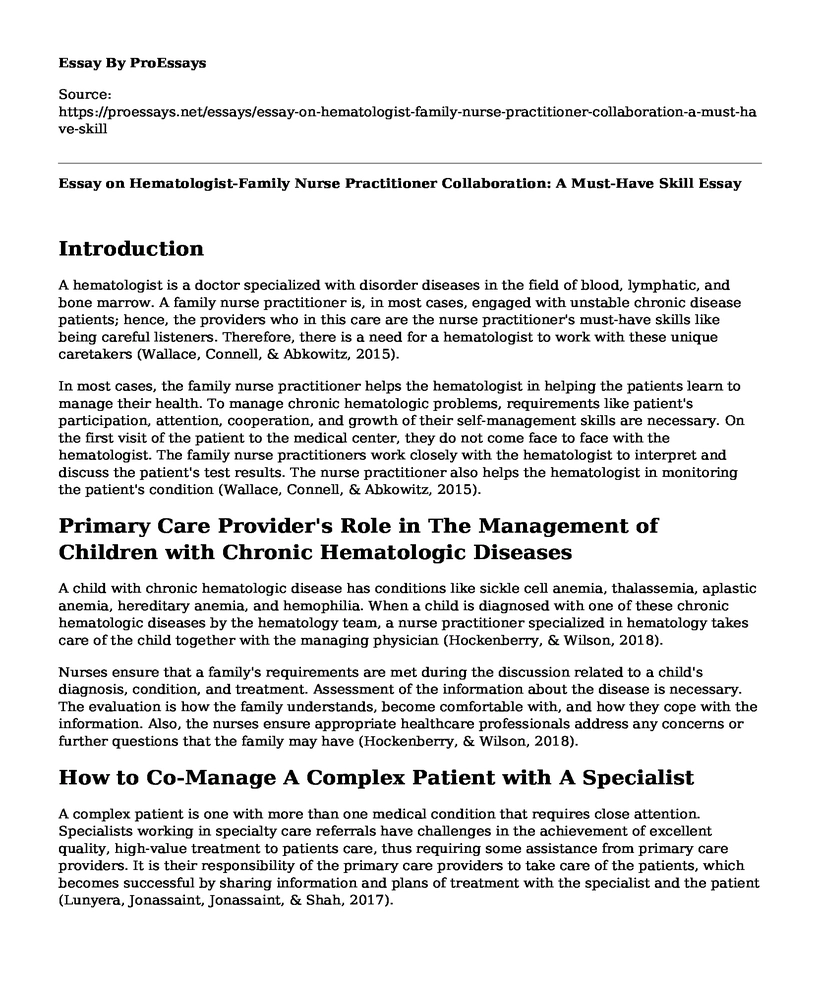Introduction
A hematologist is a doctor specialized with disorder diseases in the field of blood, lymphatic, and bone marrow. A family nurse practitioner is, in most cases, engaged with unstable chronic disease patients; hence, the providers who in this care are the nurse practitioner's must-have skills like being careful listeners. Therefore, there is a need for a hematologist to work with these unique caretakers (Wallace, Connell, & Abkowitz, 2015).
In most cases, the family nurse practitioner helps the hematologist in helping the patients learn to manage their health. To manage chronic hematologic problems, requirements like patient's participation, attention, cooperation, and growth of their self-management skills are necessary. On the first visit of the patient to the medical center, they do not come face to face with the hematologist. The family nurse practitioners work closely with the hematologist to interpret and discuss the patient's test results. The nurse practitioner also helps the hematologist in monitoring the patient's condition (Wallace, Connell, & Abkowitz, 2015).
Primary Care Provider's Role in The Management of Children with Chronic Hematologic Diseases
A child with chronic hematologic disease has conditions like sickle cell anemia, thalassemia, aplastic anemia, hereditary anemia, and hemophilia. When a child is diagnosed with one of these chronic hematologic diseases by the hematology team, a nurse practitioner specialized in hematology takes care of the child together with the managing physician (Hockenberry, & Wilson, 2018).
Nurses ensure that a family's requirements are met during the discussion related to a child's diagnosis, condition, and treatment. Assessment of the information about the disease is necessary. The evaluation is how the family understands, become comfortable with, and how they cope with the information. Also, the nurses ensure appropriate healthcare professionals address any concerns or further questions that the family may have (Hockenberry, & Wilson, 2018).
How to Co-Manage A Complex Patient with A Specialist
A complex patient is one with more than one medical condition that requires close attention. Specialists working in specialty care referrals have challenges in the achievement of excellent quality, high-value treatment to patients care, thus requiring some assistance from primary care providers. It is their responsibility of the primary care providers to take care of the patients, which becomes successful by sharing information and plans of treatment with the specialist and the patient (Lunyera, Jonassaint, Jonassaint, & Shah, 2017).
Differences in the Primary Care Provider's Role Versus the Specialist's Role
The primary care providers' also known as general practitioners, family doctors, or the internists are specialized in handling patients' first visit to the hospital. The general practitioners are trained with abilities to diagnose numerous health problems. The care providers help a patient correlate care under several specialists and bring back health back to normal (Lunyera, Jonassaint, Jonassaint, & Shah, 2017).
Contrary, specialists involve highly educated doctors with degrees, excellent skills, and advanced training in their specific field. Primary care providers recommend a patient to doctors for things like surgery, as most of them are well trained as surgeons. Depending on the health issue, doctors quickly treat the disease by the provision of proper medication (Vimalananda, Dvorin, Fincke, Tardiff, & Bokhour, 2018).
References
Hockenberry, M. J., & Wilson, D. (2018). Wong's nursing care of infants and children-E-book. Elsevier Health Sciences.
Lunyera, J., Jonassaint, C., Jonassaint, J., & Shah, N. (2017). Attitudes of primary care physicians toward sickle cell disease care, guidelines, and comanaging hydroxyurea with a specialist. Journal of primary care & community health, 8(1), 37-40.
Vimalananda, V., Dvorin, K., Fincke, B. G., Tardiff, N., & Bokhour, B. G. (2018). Patient, PCP, and specialist perspectives on specialty care coordination in an integrated health care system. The Journal of ambulatory care management, 41(1), 15.
Wallace, P. J., Connell, N. T., & Abkowitz, J. L. (2015). The role of hematologists in a changing United States health care system. Blood, The Journal of the American Society of Hematology, 125(16), 2467-2470.
Cite this page
Essay on Hematologist-Family Nurse Practitioner Collaboration: A Must-Have Skill. (2023, Mar 26). Retrieved from https://proessays.net/essays/essay-on-hematologist-family-nurse-practitioner-collaboration-a-must-have-skill
If you are the original author of this essay and no longer wish to have it published on the ProEssays website, please click below to request its removal:
- Against Multiculturalism? Ethnic Identity in Quinonez's Bodega Dreams
- Evolution of Self as a Nurse - Research Paper
- Essay Sample on Clinician Nurses: Team Care for Optimal Clinical Outcomes
- From Personal Choice to Public Health - Essay Sample
- UCLA STOMP: A University of Choice During COVID-19 Pandemic - Essay Sample
- My Journey to Self-Realization - Essay Sample
- Smoking Habits Among the Youth - Essay Example







